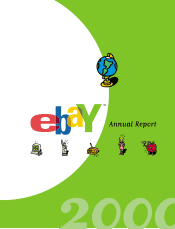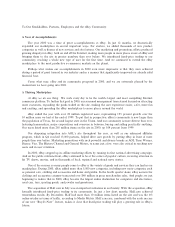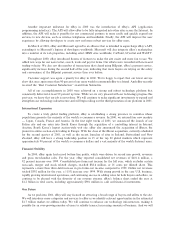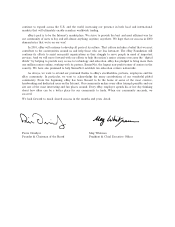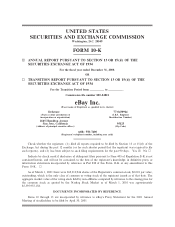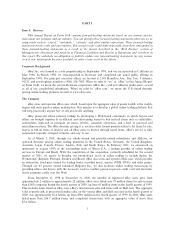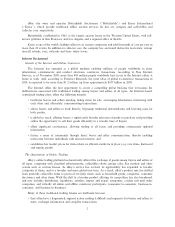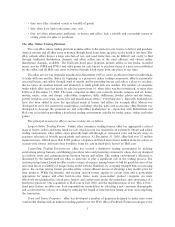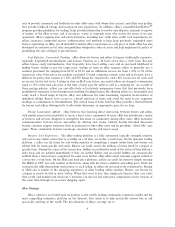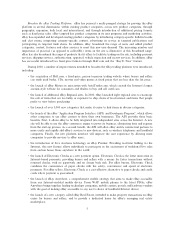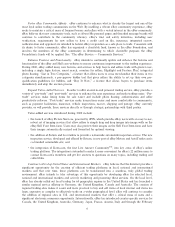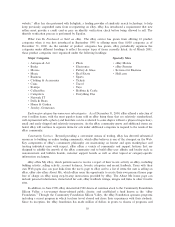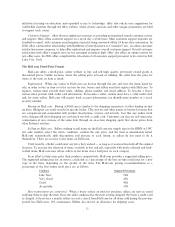eBay 2000 Annual Report Download - page 7
Download and view the complete annual report
Please find page 7 of the 2000 eBay annual report below. You can navigate through the pages in the report by either clicking on the pages listed below, or by using the keyword search tool below to find specific information within the annual report.eBay also owns and operates ButterÑelds Auctioneers (""ButterÑelds'') and Kruse International
(""Kruse''), which provide traditional oÉine auction services for Ñne art, antiques and collectibles and
collector cars, respectively.
ButterÑelds, established in 1865, is the largest auction house in the Western United States, with full-
service galleries in San Francisco and Los Angeles and a regional oÇce in Seattle.
Kruse is one of the world's leading collector car auction companies and sold thousands of cars per year in
more than 20 events. In addition to collector cars, the company has auctioned distinctive real estate, vintage
aircraft, islands, zoos, railroads and three entire towns.
Industry Background
Growth of the Internet and Online Commerce
The Internet has emerged as a global medium enabling millions of people worldwide to share
information, communicate and conduct electronic commerce transactions. According to Nua Internet
Surveys, as of November 2000, more than 400 million people worldwide had access to the Internet either at
home or work. And, according to Forrester Research, the total value of global e-commerce transactions in
2001 is expected to be more than $1.2 trillion, up from approximately $657 billion in 2000.
The Internet oÅers the Ñrst opportunity to create a compelling global business that overcomes the
ineÇciencies associated with traditional trading among buyers and sellers of all types. An Internet-based,
centralized trading place oÅers the following beneÑts:
‚ facilitates buyers and sellers meeting, listing items for sale, exchanging information, interacting with
each other and, ultimately, consummating transactions;
‚ allows buyers and sellers to trade directly, bypassing traditional intermediaries and lowering costs for
both parties;
‚ is global in reach, oÅering buyers a signiÑcantly broader selection of goods to purchase and providing
sellers the opportunity to sell their goods eÇciently to a broader base of buyers;
‚ oÅers signiÑcant convenience, allowing trading at all hours and providing continuously updated
information;
‚ fosters a sense of community through direct buyer and seller communication, thereby enabling
interaction between individuals with mutual interests; and
‚ establishes fair market prices for items where no eÇcient market is in place (e.g. rare items, distressed
and surplus goods).
The Opportunity of Online Trading
eBay's online trading platform has historically oÅered the exchange of goods among buyers and sellers of
all types, competing with classiÑed advertisements, collectibles shows, garage sales, Öea markets and other
venues such as auction houses. As eBay's service has evolved, its applicability has expanded to broader
categories of items, and to a broader and more global user base. As a result, eBay's product mix has shifted
from primarily collectible items to practical everyday items, such as household goods, computers, consumer
electronics and other items. With the shift to a broader product oÅering, its competition has also broadened,
and now includes distributors, liquidators, retailers, import and export companies, catalog and mail order
companies, and virtually all online and oÉine commerce participants (consumer-to-consumer, business-to-
consumer, and business-to-business).
Many of these traditional trading forums are ineÇcient because:
‚ they often have a fragmented, regional nature making it diÇcult and expensive for buyers and sellers to
meet, exchange information and complete transactions;
2

